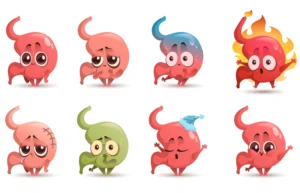 Esophageal erosion and ulcers are serious conditions that can lead to discomfort, pain, and complications if left untreated.
Esophageal erosion and ulcers are serious conditions that can lead to discomfort, pain, and complications if left untreated.
These are serious conditions that require prompt medical attention and treatment. By understanding the causes, symptoms, and treatment options for these conditions, you can take proactive steps to manage symptoms, promote healing, and prevent complications.
Today, we’ll explore the causes, symptoms, and treatment options for esophageal erosion and ulcers to help you better understand and manage these conditions.
Causes of Esophageal Erosion and Ulcers
Esophageal erosion and ulcers can occur as a result of various factors, including:
- Acid reflux. Chronic acid reflux, also known as gastroesophageal reflux disease (GERD), is one of the leading causes of esophageal erosion and ulcers. When stomach acid repeatedly flows back into the esophagus, it can irritate and damage the lining, leading to erosion and ulcers.
- Hiatal hernia. A hiatal hernia occurs when part of the stomach protrudes into the chest cavity through the diaphragm. This can increase the risk of acid reflux and esophageal damage, contributing to the development of erosions and ulcers.
- Infections. Infections caused by bacteria, such as Helicobacter pylori (H. pylori), can lead to inflammation and ulceration of the esophagus.
- Medications. Certain medications, such as nonsteroidal anti-inflammatory drugs (NSAIDs) and bisphosphonates, can irritate the esophageal lining and increase the risk of erosion and ulcers.
Symptoms of Erosion and Ulcers
The symptoms of esophageal erosion and ulcers may vary depending on the severity of the condition, but common signs include:
- Heartburn. A burning sensation in the chest or throat, especially after eating or lying down.
- Difficulty swallowing. Also known as dysphagia, difficulty swallowing may occur due to narrowing of the esophagus or the presence of ulcers.
- Pain. Sharp or burning pain in the chest, particularly when swallowing or eating acidic or spicy foods.
- Nausea and vomiting. Some individuals may experience nausea or vomiting, especially if the ulcer is severe or bleeding.
- Regurgitation. The backflow of stomach contents into the throat or mouth is often accompanied by a sour or bitter taste.
Treatment Options
Treatment for esophageal erosion and ulcers aims to alleviate symptoms, promote healing, and prevent complications. Depending on the underlying cause and severity of the condition, treatment options may include:
- Medications. Proton pump inhibitors (PPIs) and H2-receptor antagonists can help reduce stomach acid production and alleviate symptoms of acid reflux. Antibiotics may be prescribed to treat H. pylori infection if present.
- Lifestyle modifications. Avoiding trigger foods, maintaining a healthy weight, and elevating the head of the bed can help reduce symptoms and prevent further irritation of the esophagus.
- Dietary changes. Following a bland, low-acid diet and avoiding spicy, acidic, or fatty foods can help minimize discomfort and promote the healing of esophageal ulcers.
- Endoscopic therapy. In cases of severe or refractory ulcers, endoscopic procedures such as dilation or injection of medications may be performed to promote ulcer healing and relieve symptoms.
- Surgery. In rare cases where conservative treatments are ineffective, surgical intervention may be necessary to repair esophageal damage or remove abnormal tissue.
If you experience persistent or severe symptoms suggestive of esophageal erosion or ulcers, consult with a healthcare professional for proper evaluation and management. Early intervention can help alleviate discomfort and reduce the risk of complications associated with these conditions.
Picture Credit: Freepik
